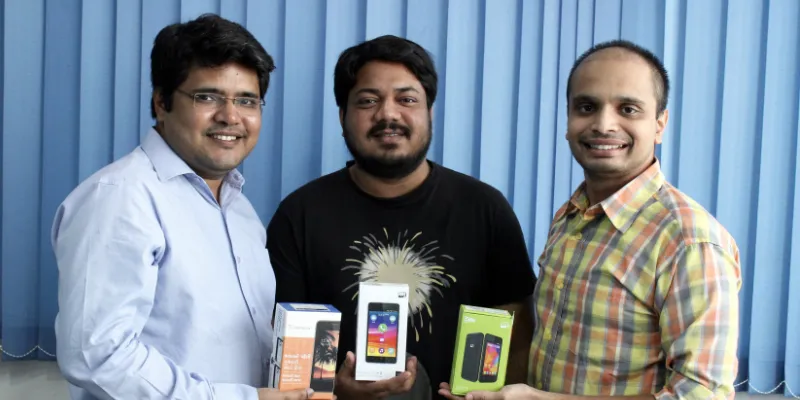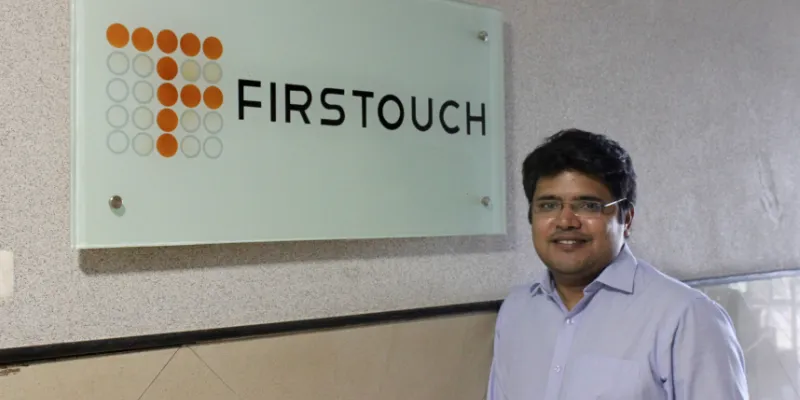Firstouch enables every Indian to use their smartphone in their own language
With 22 major languages in India written in 13 different scripts, and over 720 dialects, it is safe to assume that no single language binds this nation brimming with diversity. Yet, the smartphone – touted as the passport to knowledge, access, success, and progress – continues to have its interface entirely in English. For this population of one billion, 60 percent of which own a smartphone, merely a fraction are familiar enough with the language to use a smartphone with the ease it aims to bring to your experience.
All in their late 20s and early 30s, Rakesh Deshmukh, Akash Dongre, and Sudhir Bangarambandi, three IIT Bombay alumni, had always been fascinated by their seniors who chased a tech idea and built reputed companies out of it. Upon identifying this glaring problem,which was perhaps one of the main factors hindering Indians from attaining their potential, they were inspired to use their expertise to engineer a solution.

"The idea of Firstouch came from observing smartphone users in India struggling with English user interface as well as lack of language support in a pro-consumer way. This led us to believe that the smartphones need to be designed in a more simplistic and intuitive manner and therefore more suited to the Indian users with pro-consumer language support," Rakesh explains.
Rakesh went on to become the CEO and Co-Founder of MoFirst Solutions Ltd, the company behind Firstouch. Akash and Sudhir complete the core team as the COO and CTO, respectively.
"The country does need Firstouch since every region and community has its own unique needs and it should be served accordingly by technology. We strongly feel that lack of multi-languagesupport feature so far in smartphones has been a major roadblock in achievinghigher smartphone penetration rate," Rakesh adds.
They looked at a few of theseneeds and tried to ideate over certain innovative products and features to address the issue, like the swipe to translate feature – where a user can receive a message in any of the 10 major Indian languages and with a swipe can translate it to English to know what it means. It also allows users to translate text written in English to Indian languages and vice versa by swiping across the screen.
Another major Firstouch offering is their keyboards, which are redesigned for all 10 languages with matra predictions to make typing on the phone easy and accurate. It translates as well as transliterates – for example ‘How are you?’ becomes ‘Kaise ho?’ sooner than you can say swipe.
While many other handset companies offer their users approximatelynine to 15 Indian language options, doing so has never been as uncomplicated as a sleight of hand, which Firstouch aims to bring about for the less-savvy user.
The patented Firstouch OS is built on Android and is available in 12 regional languages, like Gujarati, Marathi, Kannada, Hindi and Bengali amongst others."Firstouch brought the concept of regional operating system to India. The concept is new and has seen a lot of traction within the industry and with the users. It brings millions of rural and semi-urban customers a perfect smartphone made in their language, to give them the simple localised experience," says Rakesh.

The company hired Vaibhav Shastri, former Head of Mobile Phones at Micromax and Chief Executive of Zen Mobiles, to expand operations and make their patented technology marketable.Funded by leading tech entrepreneurs and investors, including Kunal Bahl and Rohit Bansal from Snapdeal, Pranay Chulet from Quikr, Naveen Tiwari and Amit Gupta from InMobi, the company has language experts on board who are constantly upgrading the language aspect of the product, which Android isn't currently providing.According to a global search firm eMarketer, India will exceed 200 million smartphone users, topping the US as the world's second largest smartphone market by 2016, and 60 percent of this audience will be non-English speaking. In this wide open market, Firstouch took merely 14 weeksto reach one million first-time smartphone households in rural India, not only through their own Firstouch handsets but also through anintegration into Micromax handsets.Thus, with this licensing fee, App pre-loads and themonetisation of their App Bazaar, the company has managed to register a steady stream of revenue.
"With a fast-growing user base in emerging markets, we aim at enabling the next 500 million users to connect to the Internet in their native language and digitally connect at least 100 million users by end of 2018," says Rakesh.
“At this stage, our focus is to build crack teams across product, technology, sales and marketing, create awareness amongst the industry, and continue to innovate newer features into the OS,” says Rakesh. Firstouchhas recently launched operations in Bangladesh and plans to expandto other SoutheastAsian markets soon.







